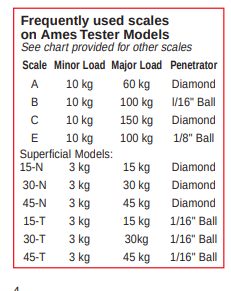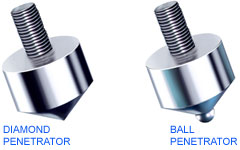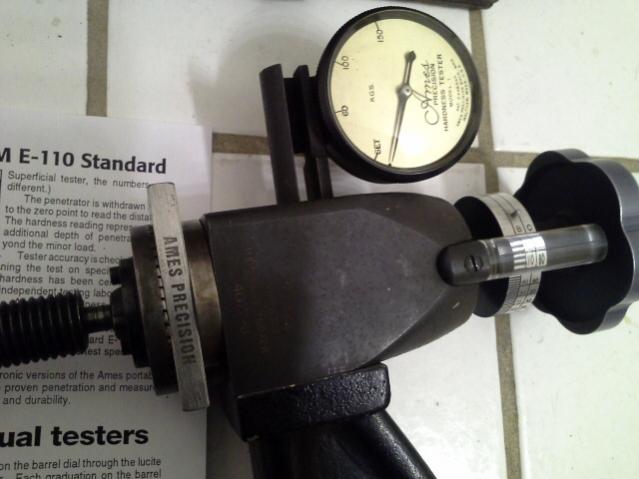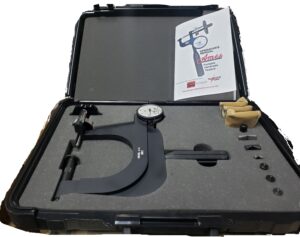The Importance of Hardness Testing in Machine Shops, Freight Yards, Warehouses, Factories and Laboratories
Hardness testing of metals before and after heat-treating is a common practice in manufacturing establishments like yours. Tests are made of materials before machining begins; of tools that are used and to check hardness after heat-treating.
Sheets of metals are tested to make certain they are not too hard to cause breakage of valuable dies. Bars are tested to insure proper machining speeds and protection of turning tools. Heat-treated parts are checked to control hardness within established limits for better performance and longer wear.
Ames Portable Hardness Testers are ideal for these purposes since they can be taken to the material receiving departments, to machines where you are working, and to every place by inspectors during the entire manufacturing process. Being portable, they check the hardness of parts while in machines being fabricated, and also after being assembled into complete sets.
Ames testers are used to check parts being machined that work harden under certain conditions. You test the hardness of large shear blades and cutters in machines, to check if heat developed in the operation of machines has affected the hardened shafts and parts. A book could be written on the many applications that Ames testers have found.
Customers all over the world learned to expect the best in design workmanship and accuracy in Ames hardness testers. With great pride, Ames offers portable hardness testers to all who make tests in Rockwell hardness scales. They are precisely made, carefully tested for accuracy, and beautifully finished. Enthusiastic owners, like you, have told others about Ames portable hardness testers and the savings made on a variety of interesting applications.
Until Ames Portable Hardness Testers were made in the year 1947, it was thought that only large bench-type hardness testers with weights and levers would give accurate results. Many attempts at building portable hardness testers were made by others that were failures, and the large bench machines seemed like the only accurate dependable type.
Ames employed the principle of the ordinary micrometer a C frame with a screw to perfect a lightweight, accurate easy-to-use hardness tester. Incorporating a sensitive dial indicator and graduated barrel dial, readings are taken directly in the Rockwell scales with no calculating or transposing. No skill is required by the operator, and the tests are made quickly and easily.
Ames portable hardness testers are used everywhere in a plant saving your company installation expenses, cost of transporting materials, and valuable stock that would be cut from bars and or sheets for test purposes with bench testers. Ames portable testers save you the cost of large stationary testers that would otherwise be needed in a plant. The cost of Ames testers is only a fraction of the bench-type testers.
The principle of Rockwell Hardness Testing is based on the scientifically established theory that a definite relationship exists between the hardness of a material and the depth of the penetration when the indentation method of measurement is used. The numbers of the Rockwell scales represent the depth of penetration when standard indenters are used under known pressure loads.

This method has proved practical and accurate and is the simplest and quickest method yet devised for measuring hardness, hence the universal acceptance of Rockwell scales as a standard for measuring hardness. For testing hardened steels and alloys by the Rockwell method, a standard “C” penetrator is used under a pressure load of 150 kgs. The penetrator has a 120-degree cone carefully ground and polished and a diamond point that has been mechanically lapped to a spherical point with a .008-inch radius. For testing soft steels, nonferrous alloys, and cast iron, a standard 1/16″ diameter specially hardened steel ball penetrator, known as the “B” penetrator, is used and a pressure load of 100 kgs is applied. Readings in other Rockwell scales are obtained by using the diamond penetrator and ball penetrators of 1/8″ and 1/2″ diameter and 60 and 100 kg loads.

In the Rockwell method of Hardness testing, two loads, a minor, or initial load and a major load are applied. The depth of penetration actually measured is the additional depth resulting from the major load after the initial or minor load has been applied. This causes no serious difficulty or computation as the tester is set back to zero following the initial load. The resultant reading is believed to be a truer and more accurate measurement of hardness, in as much as surface imperfections or variations in the piece would cause inaccurate readings. By measuring only the increment or additional depth caused by the major load, inaccurate readings due to surface variations are eliminated.
In the Rockwell B and C scales, the minor load is 10 kgs and the major load is 100 and 150 kgs respectively. In the Rockwell Superficial scales, the minor load is 3 kgs and the major load is 15, 30, and 45 kgs respectively. Ames hardness testers employ the same penetrators and pressure loads as specified in Rockwell hardness testing and consequently read directly in the Rockwell scales. A chart of Rockwell scales is provided with each tester giving the penetrators and pressure loads to be used. This chart also gives equivalent Brinell readings.

 We have compiled the following list of do’s and don’ts to protect your hardness testing machine and keep it in the best working order.
We have compiled the following list of do’s and don’ts to protect your hardness testing machine and keep it in the best working order.
